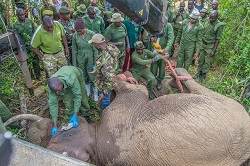Mid-March Lewa Wildlife Conservancy with the support of Kenya Wildlife Service and Save the Elephants, translocated nine elephants from Lewa to Tsavo. The reason behind this move was to address the human-wildlife conflict and by moving individual elephants that are associated with conflict cases, reduces future encounters.
Tsavo National Park is split into East and West with a combined area of over 20,000 square kilometres. Very few settlements are outside this massive park and within its boundaries is the perfect elephant habitat, already home to many of these giants that seek refuge from elsewhere.
Sadly moving animals with a history of getting into trouble does not solve the problem of human-wildlife conflict but it is better than the alternative, which is usually death through retaliatory attacks. It also helps maintain the delicate balance between conservation and livelihoods in an ever changing ecosystem. It is getting harder and harder for these impressive animals to survive as their ecosystem shrinks with encroaching settlements restricting their movements as the years go by.
Lewa has served as a catalyst for conservation across the region, stimulating the creation of numerous conservancies, both private and community-owned, increasing the amount of land under conservation management in northern Kenya to over 2 million acres since the mid-1990s.
Managed by Elewana, Lewa Safari Camp is a tourism property owned by the Conservancy itself, with the aim of boosting the conservancy’s revenue through camp occupancy. All camp profits and conservancy fees generated by the camp are reinvested directly into the conservation and community efforts of Lewa Wildlife Conservancy.






